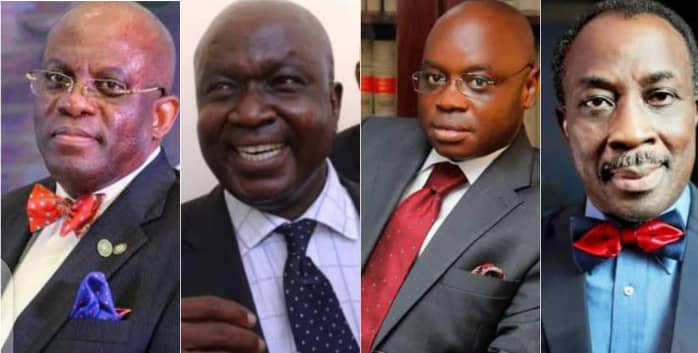
When in December 2020, the Independent Corrupt Practices and other Related Offences Commission (ICPC) released the Nigerian Corruption Index which indicted the Nigerian Justice System as the most corrupt sector in Nigeria, not many people were surprised.
The report stated: “Overall, the justice sector had the highest level of corruption with a score of 63. The level of corruption in the justice sector was heightened by stupendously high amounts of money offered as bribes to judges by lawyers handling high electoral and other political cases”.
It further claimed that about N9.457 billion was offered and paid as bribes by lawyers to judges. Six female judges, according to the agency, reported that they were offered N3.307billion and five male judges reported N392.2million. The anti-corruption commission said the cases of outright demand and offer of bribes were “mostly linked to election matters.” The survey was carried out by the Anti-Corruption Academy of Nigeria, the intellectual arm of the ICPC.
Prior to this release, several judges and senior lawyers were already in the net of the Economic and Financial Crimes Commission (EFCC) answering questions over one corrupt deal or the other. While many of these cases never saw the light of day, either by way of EFCC giving some people a soft landing, or there was not enough evidence to warrant prosecution, the anti-graft agency still managed to charge some before courts for prosecution.
One of the major mantras of the present administration of President Muhamadu Buhari since its inception in 2015 is the fight against corruption.
Although the fight has not being without it’s hitches or what some terms lopsidedness or one sided and to some, but what can not disputed is the fact that for the first time in the history of the country, there has been an attempts to scratch the surface in the fight against corruption which has virtually brought the nation to its knees.
Not long after the coming in of the present administration, the anti-corruption search-light was beamed on the political class, many politicians were arrested and charged to court by the anti- corruption agency of the government, EFCC.
However, the Nigerian Corruption Index has shown that the corruption in the political class is not comparable to that of the justice sector! Hitherto, the judiciary was seen from outside as insulated against corrupt practices.
The war against corruption has claimed some in the judicial theatre amongst whom are judges, a few lawyers have been convicted thereby losing their license to practice, some are still facing prosecution, while many have wriggled out of the net through legal technicalities.
As the fight continues to expand it’s dragnet across all areas of the nation’s life, lawyers who through their advocacy in the media and other and fora in times past have been exposed. Many believed to be decent and clean have been exposed as not better than their contemporaries in the political class, who they actually aided to steal public funds. Indeed Nigerian lawyers and judges are also rotten!
Today a Senior Advocate of Nigeria, Joseph Nwobike has been convicted and jailed for using money to pervert the course of justice. Judges like Muhammed Yunusa, James Agbadu-Fishim, Rita Ofili-Ajumogobia and several others across the country have been dismissed by the National Judicial Council (NJC).
Apart from the Bench, the Bar is also having its own fair share of the search- light. Senior lawyers like Rickey Tarfa SAN, former President of the Nigerian Bar Association (NBA), Paul Usoro, SAN, and two former chairmen of NBA, Ikeja branch, Adesina Ogunlana, and Yinka Farounbi are presently fighting the battle of their lives in various courts over allegations of fraud.
Tarfa is presently facing trial before Justice Adedayo Akintoye of a Lagos High Court for alleged perversion of justice. The case has been stalled due to the change of leadership at the EFCC that witnessed the removal of Ibrahim Magu as the head of the agency. It also affected Rotimi Oyedepo the prosecutor in the case as he was suspended alongside Magu.

For advert placement and enquiries, call 08184498145 or send an e-mail to contact@nelsdaily.com
Ogunlana and Farounbi are expected to open their defence in their trial on January 20, 2021 over stealing N21million from the coffers of NBA, Ikeja branch, where they once presided as chairmen. The case is before Justice Mojisola Dada of a Special Offences Court, Ikeja, Lagos.
The former NBA President, Paul Usoro, was first arraigned by the Economic and Financial Crimes Commission, EFCC, before Justice Muslim Hassan of the Federal High Court, Lagos on December 18, 2018 on a 10- count charge bothering on fraud. Since this arraignment, the case has gone through three judges.
Also named in the charge is the incumbent governor of Akwa Ibom State, Emmanuel Udom, described in the charge as being “currently constitutionally immune from prosecution.”
Others charged alongside are: the Akwa Ibom State Commissioner for Finance, Nsikan Nkan; Accountant-General of Akwa Ibom State, Mfon Udomah; Akwa Ibom State Attorney-General, Uwemedimo Nwoko and Margaret Ukpo, all who are said to be at large.
One of the counts in the charge sheet reads: “That you, Paul Usoro, SAN, Emmanuel Udom (currently constitutionally immune against criminal prosecution), Uwemedimo Thomas Nwoko (still at large), Nsikan Linus Nkan, Commissioner of Finance, Akwa Ibom State (still at large), Mfon Jacobson Udomah, Accountant-General, Akwa Ibom State (still at large) and Margaret Thompson Ukpe (still at large), sometime in 2015 in Nigeria, within the jurisdiction of this honourable court, conspired amongst yourselves to commit an offence, to wit: conversion of the sum of N1.4 billion property of the Government of Akwa Ibom State of Nigeria, which sum you reasonably ought to have known forms part of the proceeds of an unlawful activity to wit: criminal breach of trust and thereby committed an offence contrary to Section 18(a) of the Money Laundering (Prohibition) Act, 2011 as amended and punishable under Section 15(3) of the same Act.”
Mr Usoro, SAN, pleaded not guilty to the charges.
However, consequent upon an application by Usoro to the Chief Judge asking for the transfer the case to Akwa Ibom State, or in the alternative, to re-assigned the matter to another judge of the Federal High Court for trial, the case was transfered from Justice Muslim Hassan to Justice (Professor) Chuka Obiozor of the same Federal High Court, Lagos who in a ruling delivered on February 14, 2019 recused himself from the case on personal grounds .
Obiozor, while recusing himself from hearing the case, said the case file would be returned to the Chief Judge for reassignment to another judge.
Consequently, the case was reassigned to Justice Rilwan Aikawa.
At the resumed trial of the case on March 9, 2020, EFCC produced its first witness, Idongesit Udom, a Deputy Manager with Zenith Bank Plc, who was led in evidence by the prosecution’ counsel and later cross-examined by the defence counsel, by Mr Offiong E.B. Offiong, SAN.
Udom, under cross-examination, told the court that she and one Irene Akpabio were the Relationship Managers of the account of the firm belonging to Usoro and that she made the first statement to the anti- graft agency on July 12, 2018 and the second statement on July 19, 2018.”
She also confirmed that Usoro, his staff and herself exchanged a series of emails.
Udom further told the court that at no time was an email or letter sent to the defendant informing him that there was a payment of the sum of N300million into his account.
When asked if she could produce the letter of invitation from the EFCC, she answered in the affirmative.
It was at this point that the trial judge, Justice Aikawa, adjourned the matter till March 23, 2020 and April 21 and 22, 2020 for continuation of cross-examination.
However, due to the COVID-19 pandemic the matter could not progress as scheduled as it suffered several adjournments, but when the trial resumed on December 4, 2020, EFCC called it’s second prosecution witness, PW2, Abdulrahman Arabo, an operative with the commission.
In his evidence before Justice Rilwan Aikawa, Arabo told the court how Usoro paid the sum of N65m into the account of Mr Uwemedimo Nwoko, Attorney- General, of Akwa-Ibom State.
Arabo further informed the court that Nwoko ignored EFCC’s invitation when he was invited to come and corroborate the claim by Usoro that the sum of N65m paid into his personal account was payment for lawyers who handled the election tribunal matter in court.
When asked by the defence counsel, O.E.B Offiong, SAN, if he could not have called any of the lawyers who received the money from the Attorney General on the account of the defendant, Arabo said, “The Attorney-General was the only one we could call because the money went into his personal account and it was natural to invite him as the sole signatory to the account.”
Arabo, during cross-examination, further told the court that though EFCC had written letters to the Secretary to the State Government of Akwa-Ibom requesting the release of certain officials, the Attorney-General was at that time not included because the need had not arisen then.
He added: “However, when he was needed, he failed to show up.”
Meanwhile, Justice Aikawa has adjourned the case till January 20 and 21, 2021 for continuation of trial.
It would also be recalled that the same Usoro was mentioned in the N4.4million bribery allegation against now dismissed Justice James Agbadu-fishim of the National Industrial Court, Lagos Division, when the judge was arraigned before Justice Raliatu Adebiyi of an Ikeja High Court sometime in July 2017.
EFCC had arraigned Agbadu-Fishim for allegedly receiving N4.4million from seven Senior Advocates of Nigeria, a lawyer and a law firm from 2013 to 2015.
Paul Usoro in particular, according to the anti graft agency, was alleged to have between August 5 and December 12, 2015 deposited N300,000 and between March 25 and March 26, deposited N400,000 and N100,000 into the First Bank Account of the judge with no. 3008199491.
In the charge, Agbadu-fishim was said to have received monies from different lawyers, including some senior advocates, in the course of discharging his duties as a judge, which he could not account for.
The judge was later dismissed from service by the National Judicial Council, NJC, after he was found guilty of corruption.
Comments